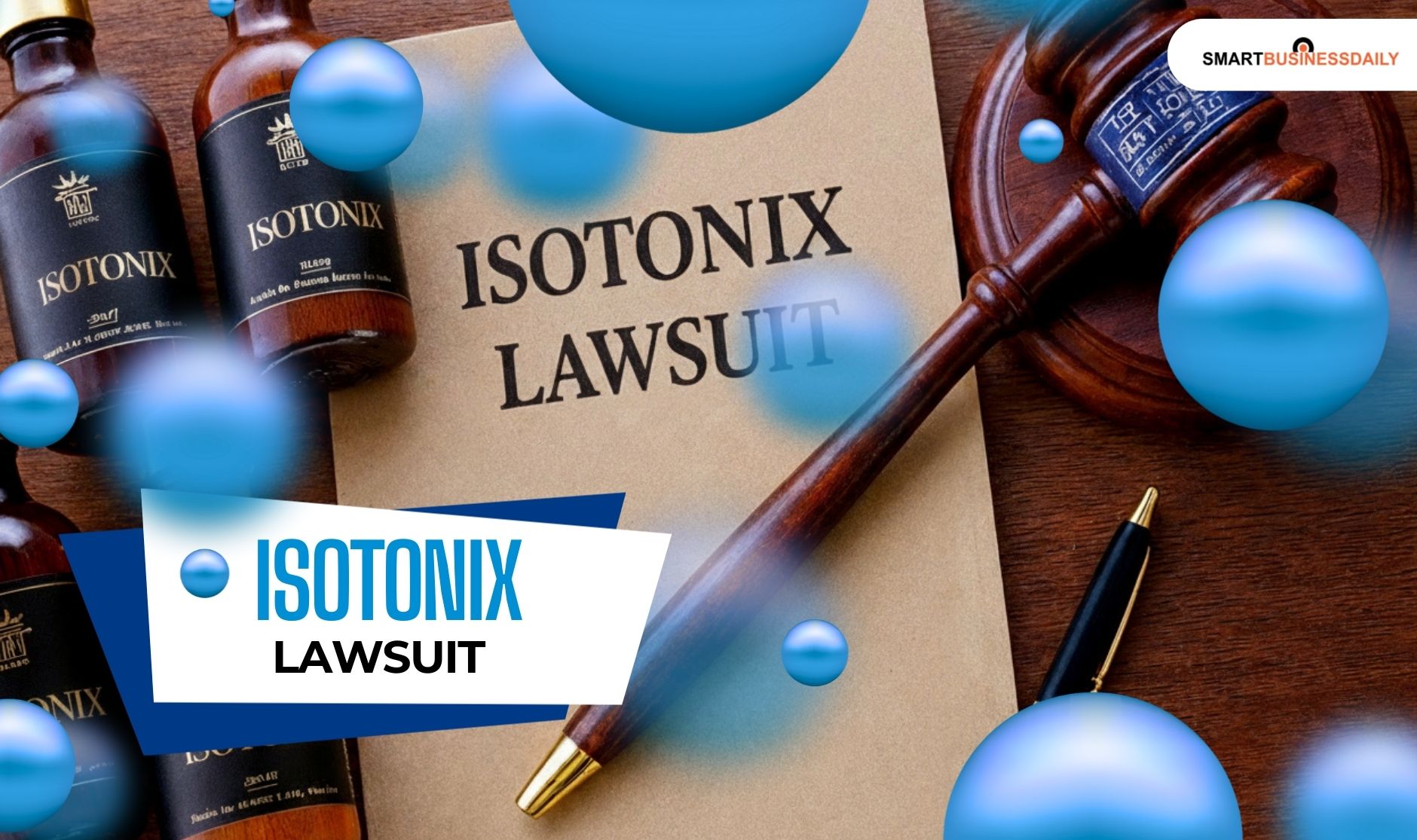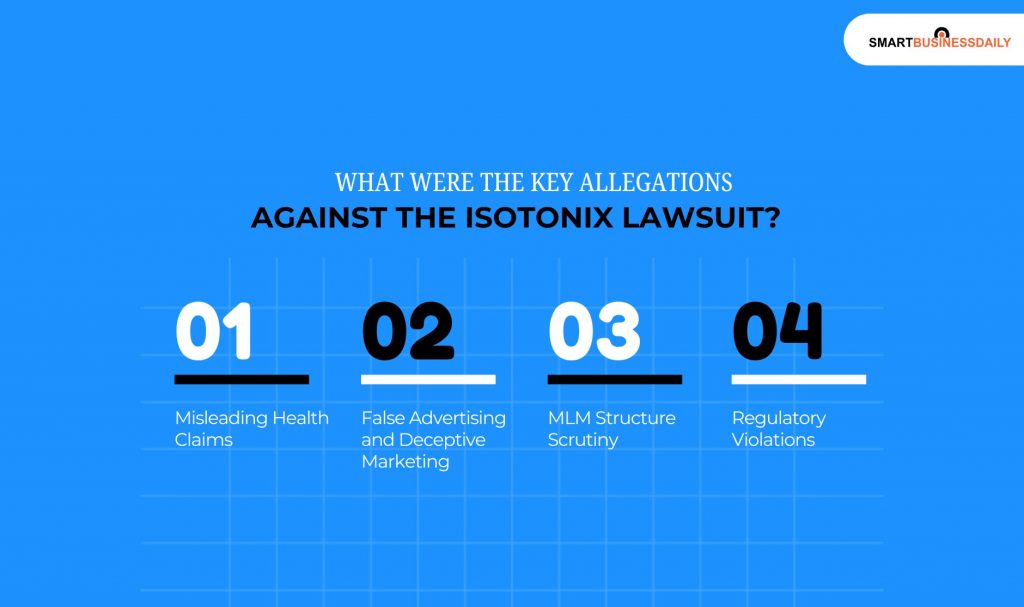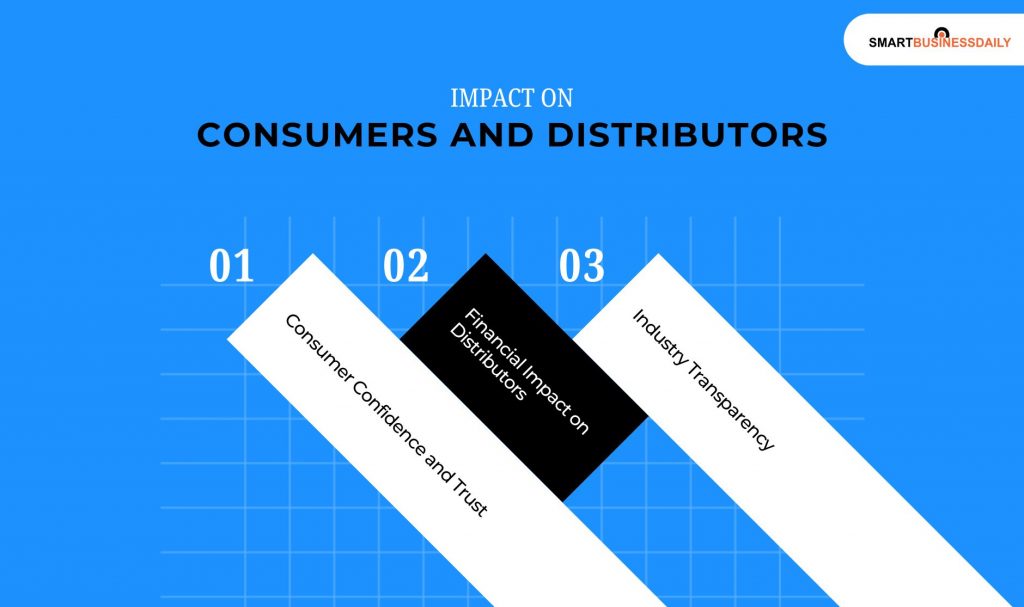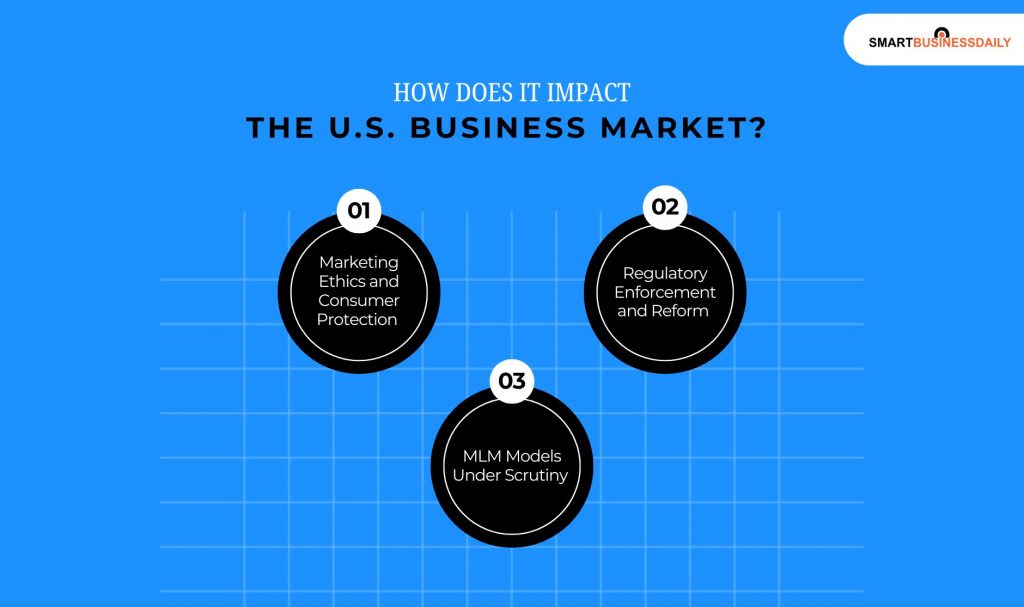Isotonix Lawsuit Explained: Understand Claims, Legal Developments, and Impacts on Health Supplements!
7 Mins Read
Published on: 23 September 2025
Last Updated on: 24 January 2026

- Isotonix Lawsuit: What Is It?
- Isotonix Lawsuit: An Overview
- How Are The Legal And Consumer Rights Involved In The Isotonix Lawsuit?
- What Were The Key Allegations Against The Isotonix Lawsuit?
- 1. Misleading Health Claims
- 2. False Advertising and Deceptive Marketing
- 3. MLM Structure Scrutiny
- 4. Regulatory Violations
- Before Diving Into Legal Arguments!
- Plaintiffs' Arguments (The Accusers)
- Market America's Response
- Case Timeline and Developments
- Financial Impact Assessment
- Regulatory Compliance Overview
- 1. FDA Oversight
- 2. FTC Enforcement
- Impact on Consumers and Distributors
- 1. Consumer Confidence and Trust
- 2. Financial Impact on Distributors
- 3. Industry Transparency
- What Were The Major Concerns And Complications Regarding The Lawsuit?
- How Does It Impact The U.S. Business Market?
- 1. Marketing Ethics and Consumer Protection
- 2. Regulatory Enforcement and Reform
- 3. MLM Models Under Scrutiny
- Consumer Rights and What You Can Do
- The Isotonix Lawsuit in Perspective
- Up next..
The dietary supplement industry has grown exponentially over the past few decades, fueled by consumer interest in wellness, preventative health, and natural remedies.
Amid this growth, controversies over marketing practices, scientific claims, and business models have triggered legal disputes.
One of the most notable of these is the Isotonix lawsuit, a multi-faceted legal battle involving Market America and its Isotonix line of supplements touching on consumer protection, advertising law, multi-level marketing (MLM) practices, and regulatory compliance.
This comprehensive article explains what the Isotonix lawsuit is about, the claims made, legal developments through 2026, regulatory context, key impacts on consumers and the supplement industry, and what this means for the future of health supplements.
Isotonix Lawsuit: What Is It?

The Isotonix lawsuit is about taking legal action against Market America, the company that sells Isotonix health supplements.
People have accused the company of false health claims, deceptive marketing, and an ostensibly unethical MLM business.
In addition, issues with FDA regulations and customer concerns about income misrepresentation made it a popular case.
In other words, the lawsuit is about the extent to which Market America sold not merely supplements but ideas that might not have been true.
Isotonix Lawsuit: An Overview

What are Isotonix supplements? Isotonix supplements are dehydrated vitamins and wellness supplements that profess that there is a unique way of increasing the body’s absorption of nutrients.
It seems okay on the surface. But as more people and officials asked for quantitative scientific proof, problems started arising.
The lawsuit is not merely about whether the supplements work. It is also about how they were marketed, the business arrangement that was behind them, and whether there was a violation of legal and ethical standards.
How Are The Legal And Consumer Rights Involved In The Isotonix Lawsuit?
The lawsuit is based on major consumer issues, including truthful representation, fair business practices, and safe product rules.
- Consumers are entitled to the truth about whether a supplement is or is not as advertised.
- Distributors should also know about realistic income potential before joining an MLM network.
- Those regulating bodies, including the FDA and FTC, must step in where product assertions and business platforms are misleading or dangerous.
That is why the lawsuit is not merely an individual problem but one that is crucial to the public and the regulator.
What Were The Key Allegations Against The Isotonix Lawsuit?

Multiple lawsuits and legal complaints have been filed over the years, centering around several overlapping allegations:
1. Misleading Health Claims
Plaintiffs contend that Isotonix and Market America made exaggerated or unsupported claims about the health benefits of the supplements. Such as superior absorption, disease prevention, and enhanced immune function despite limited peer-reviewed scientific evidence.
Under U.S. law, dietary supplements are not allowed to:
- Diagnose, treat, cure, or prevent disease,
- Claim drug-like effects without FDA approval.
Critics argue that some marketing materials crossed these legal lines.
2. False Advertising and Deceptive Marketing
The lawsuits assert that Isotonix used terms like “scientifically proven,” “clinically effective,” and claims about rapid bioavailability without strong independent studies to substantiate those claims which may violate false advertising and consumer protection laws.
3. MLM Structure Scrutiny
A major thread in the litigation relates to Market America’s MLM compensation system. Plaintiffs allege that:
- The model emphasizes recruitment over retail sales,
- Many distributors fail to earn meaningful income, and
- Some were allegedly misled about earning potential.
This has led to pyramid scheme allegations, a serious legal claim if proven though Market America disputes that characterization and maintains compliance with MLM regulations.
4. Regulatory Violations
Official warnings from regulatory bodies most notably an FDA warning letter issued in 2020 noted:
- Misbranding of product labels (e.g., inaccurate serving sizes),
- Failure to report serious adverse events as required, and
- Promotion of disease-related claims without approval.
These warnings brought governmental attention and heightened legal risk.
Before Diving Into Legal Arguments!
The plaintiffs and the defence both made strong arguments, which were evidence-based and laden with scientific studies and marketing materials.
This is not a matter of opinion, but rather the question of whether Market America’s advertisements for its Isotonix products could be scientifically substantiated and satisfy regulatory standards.
Plaintiffs’ Arguments (The Accusers)
The plaintiffs alleged that the health benefits attributed to Isotonix were not substantiated with credible scientific evidence.
They claimed that the advertising exaggerated the effectiveness of the products themselves to the point of making artificially great claims about achieving extraordinary results.
They questioned the company’s business structure, describing it as recruitment-oriented most of the time, thus functioning more like a pyramid scheme than a sales-driven model.
In addition, they alleged that Market America lured its distributors into believing they had the opportunity to earn significant amounts of money and achieve financial freedom, even though the majority of participants ultimately earned little to nothing.
Market America’s Response
The defence provided in-house research demonstrating the usefulness of the products. Moreover, they also claimed that all marketing materials were compliant with any FDA requirements, and they review the materials daily.
On the other hand , they contended that the MLM structure was legitimate. It comes with proper financial disclosures. Also, distributors were provided with definitive training materials to set realistic expectations regarding the income earned.
Case Timeline and Developments
To make this less boring for the readers, let’s turn it into a quick story timeline.
| Date | What Happened | Why It Mattered |
|---|---|---|
| Initial Filing | Multiple consumer grievances consolidated | Defined the scope of the proceeding |
| Discovery Phase | Document production and depositions | Revealed crucial evidence and testimonies |
| Expert Testimony | Both sides retained scientific experts | Battled over whether Isotonix claims held water |
| Preliminary Hearings | Early court assessments | Decided if the case was prosecutable |
| Settlement Talks | Discussions and attempts at negotiation | Expressed desire to settle without trial |
Financial Impact Assessment
When lawsuits like this hit, they don’t just affect reputation—they also shake the wallet.
| Category | Claimed Damages | Company’s Pushback |
|---|---|---|
| Distributor Losses | Money spent on inventory | Disputed as legally agreed-upon investments |
| Marketing Costs | Expenses on deceptive advertisements | Defended as legitimate business expenditures |
| Legal Costs | Court and lawyer fees | Regular court costs |
| Business Impact | Lost potential earnings | Contested as speculative |
Regulatory Compliance Overview
Understanding the Isotonix lawsuit requires a basic grasp of how dietary supplements are regulated in the United States:
1. FDA Oversight
Unlike pharmaceutical drugs, dietary supplements are not FDA-approved prior to marketing.
Their manufacturers must ensure safety and truthful labeling, but they can only make structure/function claims unless they conduct formal drug approvals.
When companies make unapproved disease claims, regulators may intervene as seen in Isotonix’s FDA warning letter.
2. FTC Enforcement
The Federal Trade Commission (FTC) oversees advertising practices. It evaluates whether health and income claims are substantiated and non-deceptive.
FTC scrutiny can accompany or trigger private lawsuits alleging false advertising or deceptive practices.
| Area | The Problem | How They Tried to Fix It |
|---|---|---|
| FDA Guidelines | Adequacy of evidence supporting product claims | Better systems of product documentation |
| FTC Rules | Shady income promises for distributors | Updated agreements with clearer disclosures |
| State MLM Laws | Looked too much like a pyramid | Adjusted model to show real retail focus |
| Consumer Protection | Inadequate marketing transparency | Included explicit disclosure protocols |
| Quality Control | Inconsistent testing of products | Better testing and lab standards |
Impact on Consumers and Distributors

The Isotonix lawsuit carries a range of impacts on different stakeholders:
1. Consumer Confidence and Trust
Many consumers report mixed experiences with Isotonix products from positive wellness effects to disappointment and a sense of being misled by bold claims.
The lawsuit has contributed to consumer skepticism about supplement efficacy and marketing honesty.
2. Financial Impact on Distributors
Former distributors have raised concerns about income misrepresentation, with many earning little relative to the cost of products, fees, and marketing expenses. These claims have led to economic harm allegations tied to the MLM business structure.
3. Industry Transparency
The legal dispute underscores a broader demand for greater transparency in supplement labeling, evidence disclosure, and honest income projections in MLM models. This trend may influence how companies craft claims and educate customers/distributors.
What Were The Major Concerns And Complications Regarding The Lawsuit?
The lawsuit challenged not just Isotonix products, but also bigger issues, such as the failure to clarify health statements. It created an atmosphere of distrust about the entire industry.
Secondly, multi-level marketing systems complicate the difference between fair trade and an exploitive system. Lastly, the compliance gaps gave large corporations a license to compete fiercely with minimal restraints.
How Does It Impact The U.S. Business Market?

The lawsuit impacted how much people believed in Market America. It also significantly impacted numerous other businesses.
Other supplement manufacturers and MLM businesses began taking a closer look at what they were doing.
The Isotonix lawsuit isn’t just about one company it reflects systemic issues in the wellness and MLM sectors:
1. Marketing Ethics and Consumer Protection
Legal scrutiny pressures companies to back health claims with rigorous science rather than marketing hype a shift toward evidence-based advertising that may improve consumer protection.
2. Regulatory Enforcement and Reform
Regulators may use lessons from this case to tighten oversight, enforce more rigorous adverse event reporting, and clarify what companies can and cannot claim about supplement benefits.
3. MLM Models Under Scrutiny
Lawsuits alleging pyramid scheme characteristics draw attention to compensation structures and distributor disclosures across the MLM industry prompting calls for improved transparency and fair practices.
Consumer Rights and What You Can Do
If you’ve purchased Isotonix products or were a distributor and believe you were misled:
- Document your experience and gather receipts, ads, and communications.
- Consult with a consumer protection attorney about possible claims for deceptive advertising or refund rights.
- Monitor ongoing class action developments, as settlements may offer compensation or changes in company practices.
Lawsuits like this often include opt-in deadlines or requirements to take action if you want to preserve legal rights. (Always consult a qualified attorney for guidance.)
The Isotonix Lawsuit in Perspective
The Isotonix lawsuit encapsulates many of the legal and ethical challenges facing the dietary supplement industry in 2026:
- Marketing vs. science: The tension between persuasive claims and scientific backing.
- Regulation vs. market freedom: Balancing consumer safety with industry innovation.
- MLM business practices: Ensuring transparency and fairness in compensation models.
- Consumer empowerment: Heightened awareness of rights and evidence standards.
Whether the lawsuit ultimately results in major sanctions, settlements, or reforms it has already contributed to a broader conversation about accountability, transparency, and trust in health supplements.



















Comments Are Closed For This Article